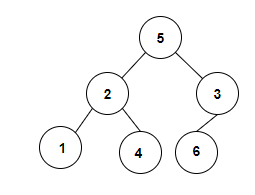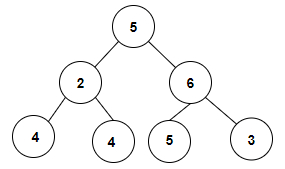
 Data Structure
Data Structure Networking
Networking RDBMS
RDBMS Operating System
Operating System Java
Java MS Excel
MS Excel iOS
iOS HTML
HTML CSS
CSS Android
Android Python
Python C Programming
C Programming C++
C++ C#
C# MongoDB
MongoDB MySQL
MySQL Javascript
Javascript PHP
PHP
- Selected Reading
- UPSC IAS Exams Notes
- Developer's Best Practices
- Questions and Answers
- Effective Resume Writing
- HR Interview Questions
- Computer Glossary
- Who is Who
Count pairs in a binary tree whose sum is equal to a given value x in C++
We are given an integer value and a variable x and the task is to construct the binary tree and find the pairs having sum equals to the given value x.
For Example
Input
int x = 5, The tree which will be created after inputting the values is given below −

Output
Count of pairs in a binary tree whose sum is equal to a given value x are: 2
Explanation
we are given with an array of integer values that is used to form a binary tree and we will check whether there is a pair present in a binary tree whose sum equals to the given value x which is 5. So, the pairs formed are (2, 3) and (1, 4).
Input
int x = 8, The tree which will be created after inputting the values is given below −

Output
Count of pairs in a binary tree whose sum is equal to a given value x are: 3
Explanation
we are given with an array of integer values that is used to form a binary tree and we will check whether there is a pair present in a binary tree whose sum equals to the given value x which is 8. So, the pairs formed are (2, 6), (4, 4) and (5, 3).
Approach used in the below program is as follows −
Create a structure of a node that contains the data part and the left and right pointers which will be pointing to the left and right subtree.
Input an integer value and use them to create a binary tree by entering the data to the node through left and right pointers.
Input a value of x which will be used to calculate the pairs having sum value as of x.
Create a boolean function to check whether the sum of pairs is x or not.
Inside the function, check if root is NULL then return False
Check IF root not equals ptr and data of root + data of ptr is equals to x then return True.
Call check function recursively by passing the left pointer of root, ptr and value x and also right pointer of x, ptr and x. Now check whether any of the conditions is returning true then return true.
Else, return false.
Create a function total_pairs to calculate the count of pairs with sum as x
Inside the function, check if ptr is NULL then return 0.
Call the function check by passing root, ptr and x as an argument. IF the function returns true then increment the value of total pairs by 1
Call function total_pairs recursively by passing root, left pointer of ptr, x and total and also pass root, right pointer of ptr, x and total.
Print the result as an integer value stored in a variable total.
Example
#include <bits/stdc++.h>
using namespace std;
struct tree_node {
int data;
tree_node *left, *right;
};
tree_node* create_node(int data){
tree_node* newNode = (tree_node*)malloc(sizeof(tree_node));
newNode−>data = data;
newNode−>left = newNode−>right = NULL;
}
bool check(tree_node* root, tree_node* ptr, int x){
if(root==NULL){
return false;
}
if (root != ptr && ((root−>data + ptr−>data) == x)){
return true;
}
if (check(root−>left, ptr, x) || check(root−>right, ptr, x)){
return true;
}
return false;
}
void total_pairs(tree_node* root, tree_node* ptr, int x, int& total){
if(ptr == NULL){
return;
}
if(check(root, ptr, x) == true){
total++;
}
total_pairs(root, ptr−>left, x, total);
total_pairs(root, ptr−>right, x, total);
}
int main(){
int x = 5;
int total = 0;
tree_node* root = create_node(5);
root−>left = create_node(2);
root−>right = create_node(3);
root−>left−>left = create_node(1);
root−>left−>right = create_node(4);
root−>right−>left = create_node(6);
total_pairs(root, root, x, total);
total = total / 2;
cout<<"Count of pairs in a binary tree whose sum is equal to a given value x are: "<< total;
return 0;
}
Output
If we run the above code it will generate the following output −
Count of pairs in a binary tree whose sum is equal to a given value x are: 2

